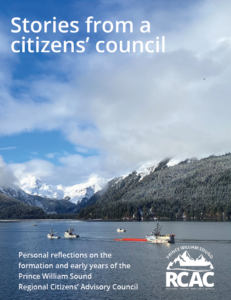One of the most radical innovations to come out of the Exxon Valdez oil spill was the establishment of permanent, industry-funded citizen oversight to promote the environmentally safe operation of the oil industry.
 In 2013, interviews with key participants in the formation of the Prince William Sound Regional Citizens’ Advisory Council were conducted by Sharon Bushell and Stan Jones. In 2015, for the 25th anniversary of the Council’s founding, these stories about its early development and lessons learned were released. In 2023, this publication was reprinted with a new foreword, ahead of the 35th anniversary.
In 2013, interviews with key participants in the formation of the Prince William Sound Regional Citizens’ Advisory Council were conducted by Sharon Bushell and Stan Jones. In 2015, for the 25th anniversary of the Council’s founding, these stories about its early development and lessons learned were released. In 2023, this publication was reprinted with a new foreword, ahead of the 35th anniversary.
These stories help us understand how citizens and the oil industry rallied together to create an oversight group to protect Prince William Sound from future oil spills.
These reflections are in oral history format. Oral history is the practice of preserving personal testimonies about the human experience.
Subjectivity is both the greatest strength and weakness of oral history; it can convey feelings and emotions linked to a specific time period, but the information may not be as accurate as other historical methods. As stated by Mark Hutton in his interview, “sometimes memories are colored by the hope of what you thought you were trying to do and not necessarily exactly the way it happened. Twenty years ago was a long time ago and this is my best recollection.”
The first four parts of this history consist of highlighted quotes, pulled from the interviews, which tell the story of the Council. Many more valuable details are contained in the full text of the interviews, which can be found in the last section in alphabetical order. Minor edits have been made to the interviews for clarity.